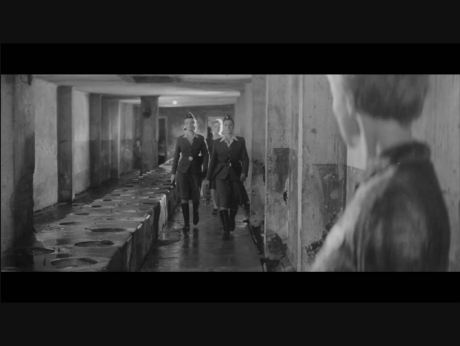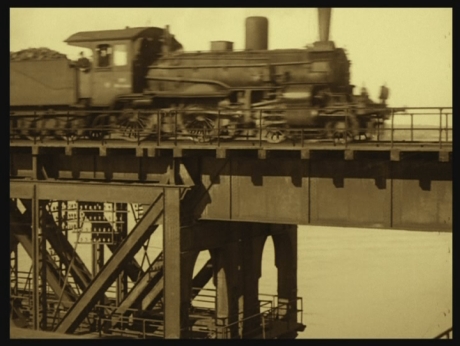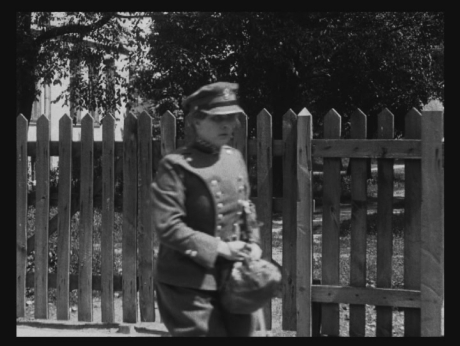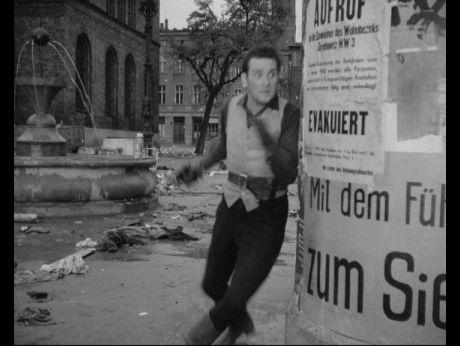
 overview
overview
The film begins with a series of snapshots from the times of the German occupation in Poland: raids, transports, and finally the Auschwitz concentration camp in the suburbs of Oświęcim. Female prisoners from one of the numerous blocks stand at the roll call all night long. Soon one of them, Helena, gives birth to a child, which is unacceptable at the camp. Her companions, however, try to hide the infant.

 storyline
storyline
The film begins with a series of snapshots from the times of the German occupation in Poland: raids, transports, and finally the Auschwitz concentration camp in the suburbs of Oświęcim. Female prisoners from one of the numerous blocks stand at the roll call all night long. Soon one of them, Helena, gives birth to a child, which is unacceptable at the camp. Her companions, however, try to hide the infant.
A new transport arrives. Among the new prisoners is a Jewish woman named Marta. She speaks German and turns out to be needed and thus does not go to the gas chamber. She becomes a camp translator but uses his function to help other prisoners too.
The next scenes illustrate the terrible everyday life at the concentration camp: the Lagerarzt (camp physician) finds the infant and injects him with poison while an SS man kills a prisoner who dared to sing at work. There is also another selection of prisoners to be gassed in the chambers (among the victims is one of the main heroines, Michele). Jakubowska manages to portray the divisions between the female prisoners and the enormous power the Block Leader had, being able to condemn someone to death or save someone’s life. Those women served the Germans at the price of modest luxuries, believing that this way would save their lives. At the same time, among the prisoners arises hope for survival and willingness to fight, as the Red Army approaches Oświęcim.
One day, information spread around the camp that an international commission is going to inspect Auschwitz to assess sanitary conditions. The Lagerarzt orders to prepare one room for show and put the patients on separate beds with clean sheets on. However, during the visit, one of the prisoners, Doctor Eugenia, reveals to the commission what other rooms look like. After the committee leaves, Eugenia is tortured and then executed.
After her death, the hospital transforms a lot. The new doctor reports to the Nazis, but is exposed by Anna, a German communist who ends up in the camp bunker. Marta, in turn, plans to escape with another prisoner, Tadeusz. They leave the camp in officers' clothes, but soon the Germans catch them. Marta is sentenced to death by hanging. Before the execution takes place, she slaps the camp commander across the face. Soviet planes are coming. Before her death, Marta says: "We must not let Oświęcim happen again".

 comment
comment



















Piotr Śmiałowski
The Polish Film World Heard About
Wanda Jakubowska’s „The Last Stage” practically from the time of its premiere in March 1948 became a legendary picture for the Polish cinema. In the second half of the 1940s, the post-war Polish cinema faced struggles to create its own production facilities, while clerks from the program department studied each and every script project thoroughly for fear of an undesired political message. Jakubowska seemed to stand high above those restraints. Especially so, since she had undisputed arguments in her hand: her then upcoming film about the mass extermination touched upon well-known issues for the contemporary viewer, as they were a part of the national experience of the Second World War. Besides, the film received a blessing from Moscow, which practically closed the mouths of its critics in the country, including Aleksander Ford himself, the then managing director of Film Polski.
“The Last Stage” was meant to become the first cinematic representation of the dramatic fate of people locked in concentration camps and it instantly gathered the attention of the world which have just started to work through the trauma the Second World War had left. Jakubowska was predestined to direct such a film like no one else, being an Auschwitz-Birkenau prisoner herself. By shooting the film, she meant not only to share the truth about Auschwitz with the world, but also to liberate herself from her own tragic memory.
The director was during the war an activist of Polish Socialist Workers Party [Robotnicza Partia Polskich Socjalistów]. She got herself engaged in politics and conspiracy because she was not able to shoot movies at the time. Soon, she got arrested, but it was not her underground activity that got her captured. Jakubowska had a parcel in Żoliborz. Someone organized an arms dump nearby. When the Germans discovered it, they arrested all the people who lived in the area. Jakubowska first went to Pawiak and after a few months was removed to Auschwitz. “My willingness to shoot this movie – she recollected many years later – is probably the main factor I owe my life to. This willingness kept me from experiencing Oświęcim subjectively, allowing me at the same time to take everything that surrounded me as a specific form of documentation.”
After escaping the camp with the end of the war, Jakubowska began to work on a novel together with Gerda Schneider, who knew the everydayness of camp life, as she came there with one of the first transports. They came with the main threads and the storyline together, either incorporating their own experiences or drawing on the stories they heard about. The first version of the film was very explicit. The director knew that graphic images could be too much for the viewers to endure. That is why she continued to work on the novella, getting rid of all the gruesome descriptions, adding new details and giving the whole story the shape of a classical film script with the working title “Oświęcim.” Its main motive was heroization of the characters, which was later reflected in the final version of the film.
„Ostatni etap” was filmed on site in Auschwitz-Birkenau. Authenticity was taken care of to the extent that actresses wore real stripped uniforms, whereas episodic roles were played by real German prisoners of war (this method was already practised in 1946 in Leonard Buczkowski’s “Forbidden Songs”). There were moments when the experiences of those who had survived the camp and now played in Jakubowska’s film drastically came to the fore. “I will never forget that particular monumental scene […] of people marching work – resembles Maria Kaniewska, who played one of the guards. – There were many prisoners and we, who played the guards, had to supervise them to march in the exact way they were lined out. In an authentic camp it was known that if somebody was not to an SS man liking, she or he would be thrown to the other side of the ditch and end up in the gas chamber. That is why the real prisoners stitched themselves to each other to exit the camp in a precise and even manner. At one point I saw that one of the extras started to break ranks. I began to jerk her and then I heard this desperate scream: ‘just not to the gas.’”
The film was ready at the beginning of February 1948. The pre-release review was conducted personally by the members of the Political Bureau. A remarkable advantage of the film is its austereness and the form of a documentary. The interest of the world was even greater as “The Last Stage”, apart from the rank of the subject it depicts, carried the value of a real work of art that asks questions about the nature of evil existing inside the man. Even before the official premiere, the film was shown at a UN forum. In the successive years, Jakubowska’s film became an indispensable point of reference for all the filmmakers who wanted to face the subject of death camps.
When Steven Spielberg shot “Schindler’s List” in 1993, “The Last Stage” became watched and discussed anew. Jakubowska, for instance, flew to Telluride, Colorado, for a special screening of her film at a festival there. “This second life for my film brings me a lot of joy and satisfaction– commented the director. – In Telluride, people stopped me on the street to give me gifts. I was very touched by those proves of sympathy. I do not even know where all this come from. Perhaps those young Americans yearn for a film ‘with human face’, with an envoy. Or maybe they sense a subconscious anxiety?” “The Last Stage” is now coming back in a digitally restored version. It is due for release at Berlinale on 22 February 2020. It could be an opportunity for a new international discussion about Jakubowska’s film.
In the course of restoration works, which restored the image and sound quality to the possibly fully extent, a few questions emerged. The first one regards the opening credits. In the original version of the film, the name of the music author Roman Palester was visible in the opening credits. His name was there during the premiere of the film in March 1948 and it was printed in the contemporary film programs. However, when the composer decided to emigrate in 1949, an intertitle with his name on was cut out – probably from all demonstrative copies. The lack of the intertitle is visible in the second minute of the film (precisely 1’07’’) after the intertitle with director’s name. In all the other excerpts, the intertitles are separated with a dissolve, only here they are separated with a clear cut and a trace of the intertitle with the name Palester. The same was done in Aleksander Ford’s “Border Street” [Ulica graniczna] (1948) and Jerzy Zarzycki’s “Unvanquished City” [Miasto nieujarzmione] (1950), for which Palester composed music before emigrating. The new picture quality of “The Last Stage” allows us also to see that Edward Dziewoński played not only the camp physician, but also, with a completely different makeup, one of the German officials present at the meeting of Nazi dignitaries.
These kinds of trivia lead us to look at “The Last Stage” as an artwork that comes from certain times and were created in certain conditions. Dziewoński was casted in two roles probably because some actor did not make it to the film set, and even Jakubowska could not save Palester’s name in the lead, despite her strong position among the people of power. The director, faithful to communist views until the end of her life, included a scene when the prisoners uttered the name of Stalin with great respect and reverence. The struggle for life unveils in some scenes its political dimension. However, what was rare in those times is that Jakubowska did not burden her film with an ideological blast that would confuse its universal message. Jakubowska’s tale of the drama of life and death in the camp became an emanation of her personal truth about the sources of evil and hope for survival.
dr Piotr Śmiałowski, FINA